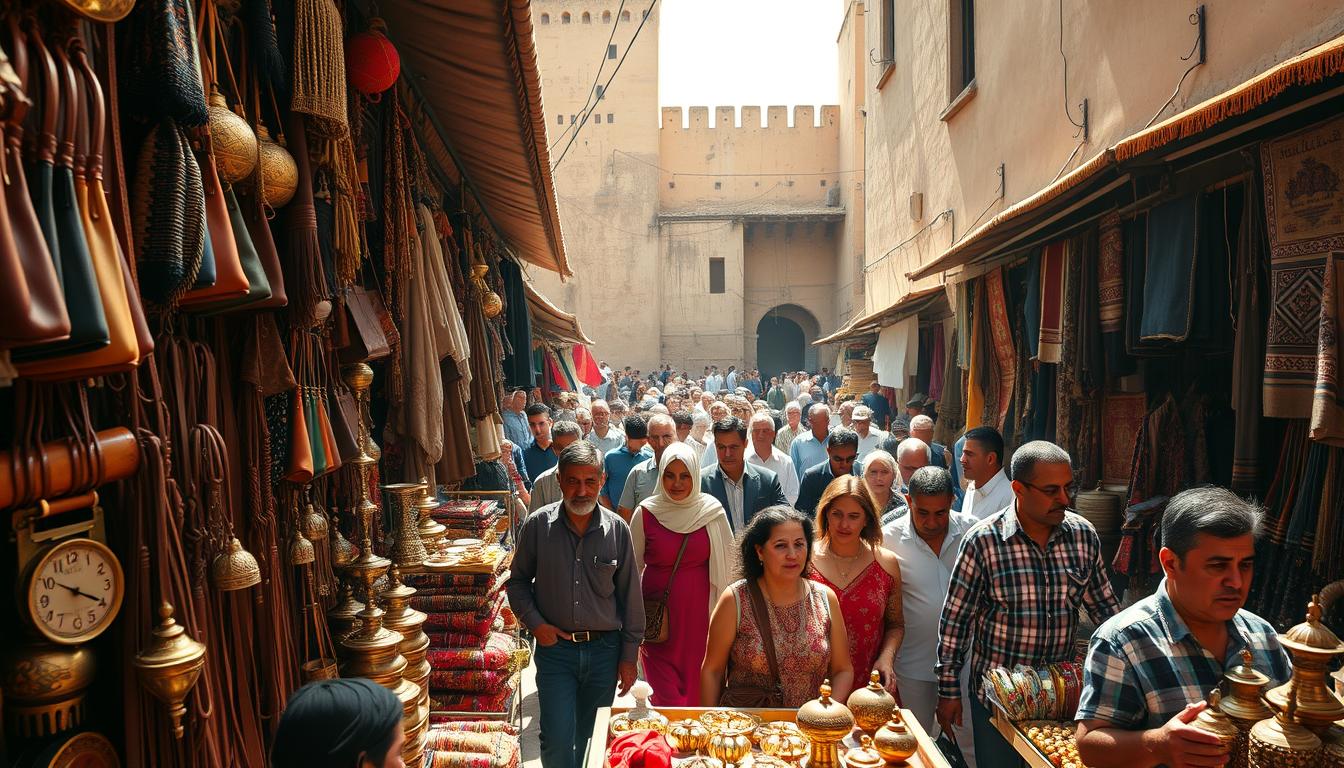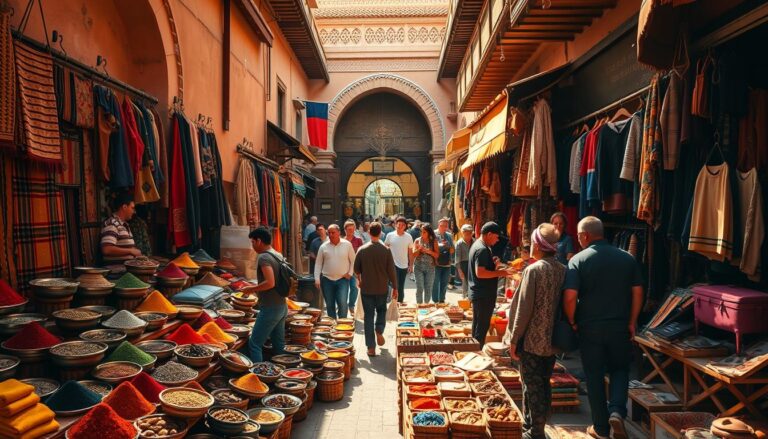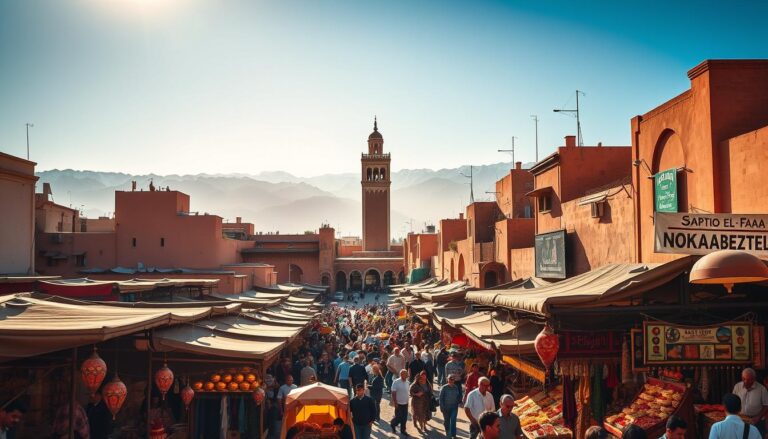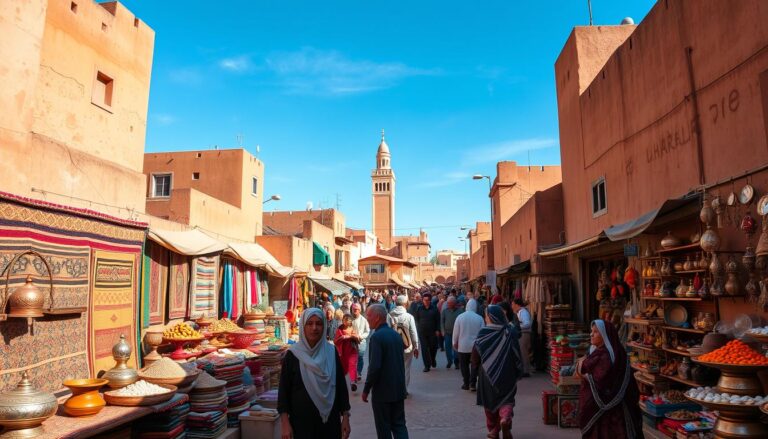5 Things NOT to Do in Morocco: Avoid These Tourist Mistakes!
Traveling to Morocco can be a thrilling experience, but being unaware of local customs and cultural faux pas can lead to unintended offense or trouble. Understanding Morocco travel tips is crucial for a respectful and enjoyable trip.
As you prepare for your journey, it’s essential to know the common tourist mistakes to avoid. Morocco, with its rich history and vibrant culture, demands a certain level of cultural awareness from its visitors.
By being informed, you can navigate the bustling markets, majestic landscapes, and warm hospitality that Morocco is known for, without inadvertently offending the locals.
Key Takeaways
- Be aware of local customs to avoid unintended offense.
- Understand the cultural norms of Morocco.
- Avoid common tourist mistakes.
- Respect local traditions and practices.
- Stay informed about Morocco travel tips.
Unveiling the Magic of Morocco: What to Expect
As you prepare for your Moroccan adventure, understanding the nuances of this captivating country is crucial. Morocco, with its rich history and diverse culture, is a land that seamlessly blends tradition with modernity.
Travelers often arrive with preconceived notions, shaped by media and hearsay. However, the reality of Morocco is far more nuanced, with its unique blend of African, Arab, and European influences.
The Contrast Between Expectations and Reality
The contrast between what you expect and what you’ll experience in Morocco can be striking. For instance, the vibrant souks (markets) and bustling medinas (old cities) are a far cry from the serene, exotic landscapes often depicted in travel brochures. Understanding this contrast is key to a fulfilling travel experience. It allows you to appreciate the authentic Morocco, beyond the romanticized or stereotypical views.
Why Cultural Awareness Matters in Morocco
Cultural awareness is vital when traveling to Morocco, a country with deep-rooted Islamic traditions and a strong sense of community. Being respectful of local customs, such as dressing modestly and being mindful of prayer times, can significantly enhance your experience. It’s not just about avoiding unintended offense; it’s about embracing the local culture and forging meaningful connections with the people you meet.
- Learn a few key Arabic phrases, like “hello” (Marhaba) and “thank you” (Shukraan).
- Be prepared to bargain when shopping at traditional souks.
- Respect local dress codes, especially when visiting mosques or rural areas.
By doing so, you’ll not only have a more enjoyable trip but also contribute to a positive, respectful interaction between cultures.
Mistake #1: Disrespecting Local Dress Codes and Customs
One of the most significant mistakes tourists make in Morocco is underestimating the importance of dressing modestly. Morocco is a conservative country with a rich cultural heritage, and dressing appropriately is a sign of respect for the local customs.
The country’s dress code is influenced by its Islamic roots and cultural traditions. Visitors who dress modestly are more likely to have a positive and respectful interaction with the locals.
Appropriate Clothing for Women Travelers
Women travelers should prioritize clothing that covers their shoulders and knees as a minimum. Loose-fitting clothing is recommended to avoid drawing unnecessary attention. In more conservative areas, it’s advisable to cover the hair as well.
When visiting rural areas or attending cultural events, women should be particularly mindful of their attire, opting for clothing that is both comfortable and respectful.
Dress Guidelines for Men
Men should also adhere to modest dressing principles, avoiding revealing clothing such as shorts and sleeveless shirts, especially in rural or conservative areas.
While the dress code for men is generally more relaxed than for women, wearing long pants and shirts with sleeves is considered respectful, particularly when visiting mosques or sacred sites.
Religious Etiquette at Mosques and Sacred Sites
When visiting mosques or other sacred sites, both men and women should dress conservatively. This includes removing shoes before entering the premises, a common practice in many Moroccan mosques.
| Dress Code Element | Guideline |
|---|---|
| Clothing Coverage | Shoulders and knees should be covered |
| Additional Precautions for Women | Cover hair in conservative areas |
| Visiting Mosques | Remove shoes before entering |
By dressing modestly and being mindful of local customs, visitors can significantly enhance their experience in Morocco, fostering a more positive and respectful interaction with the local culture.
Mistake #2: Falling for Common Scams and Tourist Traps
Morocco, a land of vibrant markets and rich history, is also a hotspot for scams targeting tourists. As you navigate the bustling souks and historic sites, it’s easy to fall prey to common scams and tourist traps. Being aware of these potential pitfalls can save you from financial loss and frustration.
Fake Guides and Unauthorized Tours
One of the most common scams involves fake guides who offer unauthorized tours. These individuals often approach tourists at popular landmarks or in crowded areas, offering their services at seemingly attractive rates. To avoid this, always research and book tours through reputable agencies or your hotel concierge. Verifying the authenticity of a guide or tour operator can significantly reduce the risk of falling victim to such scams.
Navigating Markets and Souks Safely
Navigating the souks in Morocco can be an exhilarating experience, but it requires caution. Be prepared to haggle, but don’t get caught up in overly aggressive bargaining. Keep an eye on your belongings, as pickpocketing is common in crowded areas. When making purchases, ensure you’re buying from reputable vendors to avoid counterfeit goods. Staying alert and aware of your surroundings is key to a safe and enjoyable market experience.
Transportation Scams to Watch Out For
Transportation scams are another common issue. Unlicensed taxi drivers or those using unofficial routes might overcharge or mislead tourists. To avoid this, use licensed taxi services or reputable ride-hailing apps. When using public transport, be aware of your belongings and keep an eye on your luggage.
“The best way to avoid transportation scams is to be informed and cautious, just as you would when navigating any unfamiliar terrain.”
Mistake #3: Photographing Without Permission
Understanding the etiquette of photography in Morocco is crucial to avoiding unintended disrespect towards the local culture and people. While capturing the vibrant culture and stunning landscapes can be a significant part of the travel experience, it’s essential to do so with sensitivity and respect.
Photography Etiquette in Public Spaces
In Morocco, public spaces such as souks and historical sites are rich in character and often make for compelling photographs. However, it’s polite to be mindful of your surroundings and the people within them. Always ask for permission before taking someone’s picture, especially in more intimate or sacred settings.
Taking Photos of People: The Right Approach
When it comes to photographing people, a respectful approach is key. Moroccans are known for their hospitality, but taking someone’s picture without their consent can be considered rude. Engage with the locals, learn a few basic Arabic greetings, and ask politely if you may take their photo.
Sensitive Locations and Subjects to Avoid
Certain locations and subjects are considered sensitive or off-limits for photography. These include religious ceremonies, certain government buildings, and areas of military significance. Being aware of these restrictions can help you avoid any potential issues during your visit.
| Location/Subject | Photography Permission | Tips |
|---|---|---|
| Public Souks | Generally allowed, but ask vendors | Be respectful of vendors’ goods and workspace |
| Religious Sites | Often restricted; ask permission or avoid | Dress modestly and avoid flash |
| Local People | Always ask for permission | Engage respectfully and use basic Arabic greetings |
Mistake #4: Poor Bargaining Etiquette in Souks
Bargaining in Morocco’s souks is an art form that, when mastered, can lead to a more enjoyable and respectful shopping experience. The vibrant markets are filled with a variety of goods, from colorful textiles to intricate handicrafts, making it a shopper’s paradise. However, without understanding the local bargaining customs, tourists may find themselves at a disadvantage.
The Art of Haggling: Moroccan Style
In Moroccan souks, haggling is not just about reaching a mutually agreeable price; it’s an interaction that involves respect, politeness, and sometimes, a bit of friendly banter. To haggle like a local, start by offering a price that is significantly lower than what you’re willing to pay. Be prepared to negotiate, and don’t be afraid to walk away if the price isn’t right. This method not only helps in getting a fair deal but also adds to the overall experience.
Common Bargaining Mistakes Tourists Make
One of the most common mistakes tourists make is not doing their research on the item’s value beforehand. Another mistake is being too aggressive or confrontational, which can lead to a negative experience for both parties. Additionally, not being aware of the local customs, such as greeting the vendor appropriately, can also hinder the bargaining process.
| Bargaining Mistake | Consequence | Best Approach |
|---|---|---|
| Not researching the item’s value | Overpaying for the item | Research beforehand |
| Being too aggressive | Creating a negative atmosphere | Be polite and friendly |
| Ignoring local customs | Offending the vendor | Learn local greeting customs |
When Not to Bargain: Fixed Price Situations
Not all shopping experiences in Morocco involve haggling. Some stores and supermarkets have fixed prices, and it’s essential to recognize when bargaining is not appropriate. Government-run stores, modern boutiques, and some cooperative souks may have fixed prices. Respecting these pricing policies is part of being a considerate shopper.
By understanding and respecting the local bargaining customs, tourists can enhance their shopping experience in Morocco’s souks, making it a memorable and enjoyable part of their trip.
Mistake #5: Ignoring Food and Water Safety
One of the most common mistakes tourists make in Morocco is neglecting food and water safety precautions. While exploring the local cuisine is a significant part of the travel experience, failing to take necessary precautions can lead to unpleasant health issues. Morocco offers a diverse range of culinary delights, from street food to high-end restaurants, but it’s crucial to be aware of the risks associated with consuming unsafe food and water.
Street Food: What’s Safe and What’s Not
Street food is a staple in Moroccan cuisine, offering delicious and affordable meals. However, not all street food is created equal. To minimize risks, opt for stalls or vendors that are busy and have a high turnover of food, as this usually indicates that the food is fresh and handled properly. Avoid eating undercooked meat or raw vegetables that may have been washed in untreated water. Popular street foods like grilled meats and freshly cooked tagines are generally safer options if cooked properly.
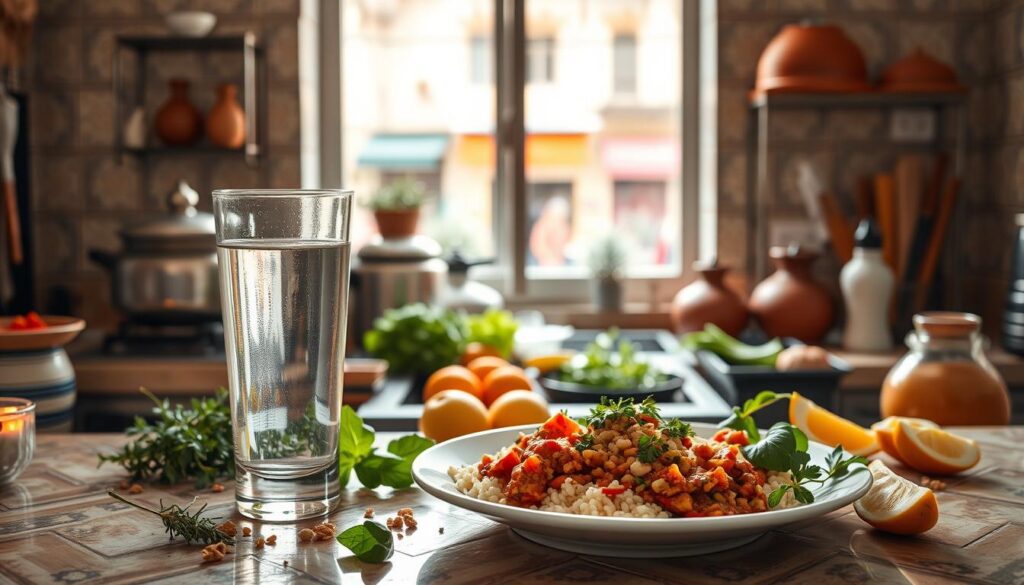
Drinking Water Precautions
Tap water in Morocco is generally not considered safe for drinking. To stay safe, it’s recommended to drink bottled or filtered water. When consuming water, ensure that the bottle is sealed, and avoid ice cubes unless you’re certain they were made from safe water. Using water purification tablets or a portable filter can also be a good precaution. Additionally, be mindful of consuming foods that may contain water, such as salads or fruits that may have been washed in tap water.
Handling Stomach Issues While Traveling
Despite taking precautions, some travelers may still experience stomach issues. If you start to feel unwell, it’s essential to stay hydrated by drinking plenty of safe water or oral rehydration solutions. Over-the-counter medications can help alleviate symptoms, but if your condition persists or worsens, consider seeking medical attention. Being prepared with a basic first-aid kit and knowing where to find medical care can make a significant difference.
| Precaution | Description | Benefit |
|---|---|---|
| Choose Busy Street Food Stalls | Opt for stalls with high food turnover | Reduces risk of foodborne illness |
| Drink Bottled Water | Ensure the bottle is sealed | Prevents waterborne diseases |
| Stay Hydrated | Drink safe water or oral rehydration solutions when ill | Aids in recovery and prevents dehydration |
5 Things NOT to Do in Morocco: Avoid These Tourist Mistakes!
Understanding and respecting local traditions is crucial when visiting Morocco to avoid cultural faux pas. Morocco is a country with a rich cultural heritage, and its people are generally welcoming to tourists. However, like any other country, it has its customs and practices that visitors should respect.
The Consequences of Cultural Insensitivity
Cultural insensitivity can lead to unintended consequences, ranging from social exclusion to legal issues. For instance, dressing inappropriately or displaying public affection can offend local sensibilities. In some cases, it might even lead to detention or deportation.
According to a travel advisory, “visitors should be aware that Morocco is a conservative society, and certain behaviors that are acceptable in other countries may be considered offensive.”
“The key to a successful trip is understanding and respecting local customs and traditions.”
| Cultural Mistake | Potential Consequence |
|---|---|
| Dressing inappropriately | Social exclusion or detention |
| Displaying public affection | Offending local sensibilities |
| Not respecting Ramadan | Social and cultural exclusion |
How to Recover from Cultural Missteps
If you unintentionally offend local customs, the key is to apologize sincerely and show a willingness to learn. Moroccans generally appreciate respect and a positive attitude. For example, if you accidentally take a photo of someone without permission, a polite apology and explanation can diffuse the situation.
To avoid or recover from cultural missteps, it’s essential to be open-minded and flexible. Engaging with local culture and people can also provide valuable insights into the dos and don’ts of Moroccan etiquette.
Regional Differences: Navigating Various Parts of Morocco
As you travel through Morocco, you’ll notice that different regions have distinct cultural norms and practices. The country’s diverse landscapes, from the Atlas Mountains to the coastal plains, are matched by the variety of its cultural heritage. Understanding these regional differences is key to a respectful and enjoyable trip.
Morocco’s regions are not just geographically distinct; they also have unique cultural identities. For instance, the bustling city of Marrakech is known for its vibrant souks and rich cultural heritage, while the coastal city of Essaouira is famous for its relaxed atmosphere and beautiful beaches.
Marrakech vs. Fez: Different Cultural Expectations
Marrakech and Fez are two of Morocco’s most famous cities, yet they have distinct cultural expectations. Marrakech is known for its modern and vibrant culture, with a blend of traditional and contemporary influences. In contrast, Fez, the ancient capital, is steeped in history and tradition, with a strong emphasis on Islamic heritage. Visitors should be aware of these differences when interacting with locals or visiting historical sites.
- In Marrakech, be prepared for a more fast-paced and energetic environment.
- In Fez, show respect for the ancient traditions and historical significance.
Coastal Cities vs. Desert Communities
The coastal cities, such as Essaouira and Taghazout, have a relaxed and open culture, influenced by their historical connection to the sea and international trade. On the other hand, desert communities, like those in Merzouga, are deeply rooted in their Berber traditions and the harsh yet beautiful desert environment. Understanding these differences can enhance your travel experience and interactions with the local communities.
- Coastal cities often have a more liberal attitude towards tourists.
- Desert communities may have more conservative values and customs.
Essential Phrases to Learn Before Visiting Morocco
Morocco’s diverse cultural landscape can be navigated more smoothly with some basic Arabic and French phrases. Understanding and using local expressions not only shows respect for the culture but also enriches your travel experience. Morocco, being a melting pot of Arabic and French influences, requires visitors to be aware of both languages for effective communication.
Arabic Greetings and Thank You’s
Learning basic Arabic greetings like As-salamu alaykum (Peace be upon you) and responses such as Wa alaykum as-salam can go a long way. Expressions of gratitude like Shukraan (Thank you) are also essential. Using these phrases during interactions with locals can lead to more meaningful exchanges.
- As-salamu alaykum – Peace be upon you
- Wa alaykum as-salam – And upon you be peace
- Shukraan – Thank you
French Phrases for Getting Around
Since Morocco is a former French protectorate, French remains a widely spoken language, especially in tourist areas and among those in the service industry. Phrases like Excusez-moi (Excuse me), Pouvez-vous m’aider? (Can you help me?), and Merci (Thank you) are invaluable for travelers. They facilitate navigation through various regions and interactions with the friendly locals.
- Excusez-moi – Excuse me
- Pouvez-vous m’aider? – Can you help me?
- Merci – Thank you
Timing Your Visit: Seasonal Considerations
Morocco’s diverse climate zones greatly influence the best time to visit. The country’s climate varies from the cool, wet winters of the north to the hot, dry summers of the south, and the mild, temperate climate of the coastal regions. Understanding these seasonal variations is crucial for planning a comfortable and enjoyable trip.
Weather Patterns Across Regions
The weather in Morocco is not uniform, with different regions experiencing different conditions. The Atlas Mountains receive significant snowfall in winter, making them ideal for skiing, while the desert regions are best visited in spring or autumn to avoid extreme heat. Coastal areas like Essaouira and Casablanca have a milder climate year-round, making them suitable for visits at any time.
Religious Holidays and Their Impact on Travel
Morocco is an Islamic country, and religious holidays can significantly impact travel plans. During Ramadan, many businesses close during the day, and while this can be a unique cultural experience, it may not be ideal for all travelers. It’s essential to plan around these holidays or be prepared for a different pace of life during these times. Major religious holidays like Eid al-Fitr and Eid al-Adha are times of celebration but can also affect tourist activities and travel.
- Be aware of the local calendar to avoid planning your trip during significant religious events unless you’re interested in experiencing them.
- Some tourist attractions might be closed or have limited hours during religious holidays.
Safety Tips for Different Traveler Types
As Morocco welcomes travelers from diverse backgrounds, being aware of safety guidelines tailored to individual traveler types is essential. Morocco is a country with a rich cultural tapestry, and understanding the specific needs of different travelers can significantly enhance the travel experience.
Solo Female Travelers in Morocco
Solo female travelers should be particularly aware of their surroundings, especially in crowded areas and markets. Dressing modestly is advised to avoid unwanted attention. It’s also recommended to stay in well-lit and populated areas at night. Morocco is generally safe for solo female travelers, but taking these precautions can help ensure a smoother trip.
Family Travel Considerations
Families traveling with children should be mindful of the local culture and customs. Teaching children about the local customs can help avoid unintended offense. Additionally, being cautious with food and water is crucial to prevent health issues. Morocco is a family-friendly destination, with many attractions suitable for children.
LGBTQ+ Traveler Awareness
LGBTQ+ travelers should be aware that while Morocco is becoming more tolerant, public displays of affection are generally frowned upon. Discretion is advised to avoid any potential issues. Researching LGBTQ+-friendly establishments and tour operators can also enhance the travel experience.
By being informed and prepared, travelers of all types can enjoy the rich experiences that Morocco has to offer, from its vibrant cities to its stunning landscapes.
Conclusion
Traveling to Morocco can be a rewarding experience when approached with cultural awareness and an understanding of common tourist mistakes. By being mindful of local customs, dress codes, and religious etiquette, travelers can avoid unintended offense and ensure a respectful interaction with the local culture. Awareness of potential scams and tourist traps, as well as an understanding of how to navigate markets and transportation safely, further enhances the travel experience.
Being cautious with photography, respecting privacy, and understanding the nuances of bargaining in souks are crucial. Taking care of one’s health by being aware of food and water safety is vital for a trouble-free trip. By avoiding the outlined tourist mistakes, travelers can have a more enjoyable and enriching experience in Morocco.
In conclusion, Morocco is a country with a rich history and culture, offering much to travelers who are willing to learn and adapt. With the right mindset and preparation, visitors can enjoy the vibrant souks, stunning landscapes, and warm hospitality that Morocco is known for. By doing so, travelers can create lasting memories of their Morocco travel experience, fostering a deeper appreciation for the local culture and way of life.
FAQ
What are the top 5 things NOT to do in Morocco?
The top 5 things NOT to do in Morocco include disrespecting local dress codes and customs, falling for common scams and tourist traps, photographing without permission, having poor bargaining etiquette in souks, and ignoring food and water safety.
How should I dress when visiting Morocco?
When visiting Morocco, it’s essential to dress modestly, covering your shoulders and knees, especially when visiting mosques or sacred sites. Women should consider wearing a scarf to cover their hair.
What are some common scams to watch out for in Morocco?
Common scams in Morocco include fake guides, unauthorized tours, and transportation scams. Be cautious when approached by overly friendly locals who offer unsolicited help or tours.
Can I take photos anywhere in Morocco?
No, it’s not advisable to take photos anywhere in Morocco without permission. Be particularly cautious when taking pictures of people, sensitive locations, or subjects.
How do I bargain effectively in Moroccan souks?
To bargain effectively in Moroccan souks, learn the local haggling style, start with a low offer, and be respectful. Avoid being overly aggressive or confrontational.
What are some food and water safety tips for Morocco?
To ensure food and water safety in Morocco, stick to reputable street food stalls, avoid undercooked meat or raw vegetables, and drink bottled or filtered water.
Are there regional differences in cultural expectations within Morocco?
Yes, Morocco has regional differences in cultural expectations. For example, Marrakech and Fez have different cultural norms, and coastal cities may have different customs compared to desert communities.
What essential phrases should I learn before visiting Morocco?
Learn basic Arabic greetings like “As-salamu alaykum” (peace be upon you) and expressions of gratitude like “Shukraan” (thank you). Knowing some French phrases like “Bonjour” (good day) and “Merci” (thank you) can also be helpful.
How can I stay safe while traveling in Morocco?
To stay safe in Morocco, be aware of your surroundings, keep valuables secure, and avoid traveling alone at night. Solo female travelers, families, and LGBTQ+ travelers should take extra precautions.

